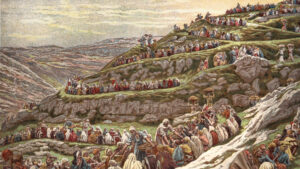When he died last week at the age of 57, pop singer Prince was arguably the most famous Jehovah’s Witness in the world. Here are nine things you should know about the obscure religious group that emerged from the Bible Student movement in the late 1870s:
1. Jehovah’s Witnesses—their name is intended to designate them as “a group of Christians who proclaim the truth about Jehovah”—compose less than 1 percent of U.S. adults, yet are among the most racially and ethnically diverse religious groups in America. According to Pew Research, no more than 4 in 10 members of the group belong to any one racial and ethnic background: 36 percent are white, 32 percent are Hispanic, 27 percent are black, and 6 percent are another race or mixed race. Roughly two-thirds (65 percent) are women, while only 35 percent are men. They also tend to be less educated, with a solid majority of adult Jehovah’s Witnesses (63 percent) having no more than a high school diploma (compared with, for example, 43 percent of evangelical Protestants).
 2. Jehovah’s Witnesses (hereafter JWs) consider themselves to be Christians (but not Protestants), even though they reject the doctrine of the Trinity. JWs claim that Jesus was not divine and that the Holy Spirit is an “active force” and not a person. JWs believe that Jesus is God’s only direct creation, “the firstborn of all creation” and therefore rightly entitled to be called the “son of God.” However, they believe that as a created being “he is not part of a Trinity.” They believe Jesus lived in heaven before coming to earth and, after his death and resurrection, he returned to heaven. They also believe Jesus “gave his perfect human life as a ransom sacrifice” and that through his death and resurrection “make it possible for those exercising faith in him to gain everlasting life.”
2. Jehovah’s Witnesses (hereafter JWs) consider themselves to be Christians (but not Protestants), even though they reject the doctrine of the Trinity. JWs claim that Jesus was not divine and that the Holy Spirit is an “active force” and not a person. JWs believe that Jesus is God’s only direct creation, “the firstborn of all creation” and therefore rightly entitled to be called the “son of God.” However, they believe that as a created being “he is not part of a Trinity.” They believe Jesus lived in heaven before coming to earth and, after his death and resurrection, he returned to heaven. They also believe Jesus “gave his perfect human life as a ransom sacrifice” and that through his death and resurrection “make it possible for those exercising faith in him to gain everlasting life.”
3. JWs believe that the kingdom of God is a real government in heaven that will soon replace human governments and accomplish God’s purpose for the earth. They believe that Jesus is the King of God’s kingdom in heaven and that he began ruling in 1914. A relatively small number of people—144,000—will be resurrected to live with Jehovah in heaven and rule with Jesus in the kingdom. They believe that God will bring billions back from death by means of a resurrection and that “many now living may yet begin to serve God, and they too will gain salvation.” However, those who “refuse to learn God’s ways after being raised to life” will pass out of existence forever (they will not suffer in a “fiery hell of torment”).
4. JWs practice door-to-door ministry because they believe it is an effective way to fulfill the Great Commission and that first-century Christians continued to spread their message both “publicly and from house to house” (they cite Acts 5:42; 20:20). They do not believe that door-to-door ministry is a means of earning salvation by doing good works. They also believe that “pressuring people to change their religion is wrong” though they do believe in attempting to argue for their particular beliefs. In their door-to-door ministry they generally distribute two magazines, Awake!, a general religious magazine, and The Watchtower, a magazine whose content is focused on “the significance of world events in the light of Bible prophecies.”
5. JWs believe the Bible is “God’s inspired message to humans.” In 1961 a JW corporation, The Watch Tower Bible and Tract Society, published its own formal equivalence translation of the Bible: the New World Translation of the Holy Scriptures (NWT). As of 2015, the NWT has been translated in whole or in part into 129 languages. Since the release of the NT translation in 1950, this version has been criticized for changing the meaning and words of the text to fit JW doctrine. A prime example is John 1:1. Both the ESV and NIV translate that verse as, “In the beginning was the Word, and the Word was with God, and the Word was God.” The NWT version translates the passage as “In the beginning was the Word, and the Word was with God, and the Word was a god.” The addition of the indefinite article “a” is added to avoid the conclusion that Jesus is God. Referring to this verse, Bruce M. Metzger wrote in 1953, “It must be stated quite frankly that, if the Jehovah’s Witnesses take this translation seriously, they are polytheists.” Despite a preference for the NWT, JWs still use other translations of the Bible in their witnessing work.
6. JWs do not celebrate either Christmas or Easter, because they believe the Bible teaches that it’s Jesus death—not his birth or resurrection—that should be celebrated. They also believe that Christmas and Easter are not approved by God because they are rooted in pagan customs and rites. They also do not celebrate birthdays because they believe “such celebrations displease God.”
7. JWs have a number of beliefs that are peculiar to their sect: While they accept medical treatments and do not practice faith healing, they don’t accept blood transfusions because they believe the “Bible commands that we not ingest blood.” They do not believe in going to war or getting involved in political matters, and they do not consider the cross to be a symbol of Christianity, because they claim “the Bible indicates that Jesus did not die on a cross but rather on a simple stake.”
8. JWs do not refer to their places of worship as churches, but rather as a “Kingdom Hall.” They have no paid clergy, for they believe the “model of first-century Christianity” is one in which “all baptized members are ordained ministers and share in the preaching and teaching work.” Both men and women can be ministers, though within each congregation “spiritually mature men” serve as “older men,” or elders.” About 20 congregations form a circuit, and congregations receive periodic visits from traveling elders known as circuit overseers. JWs are not required to tithe and no collections are taken at their meetings, though donation boxes are available.
9. Doctrinal guidance is provided by a Governing Body made up of longtime JWs who currently work at the international offices in Brooklyn, New York. A number of corporations are in use by JWs, though they are often referred to collectively as “The Society” after the oldest and most prominent of their corporation, “The Watch Tower Bible and Tract Society of Pennsylvania” (which is now located in Brooklyn). Not much is known about the financing of the JW corporations other than that they own significant real estate holdings in New York City. For instance, the group’s headquarters, which is currently for sale, is expected to be sold for around $1 billion.
Other articles in this series:
Harriet Tubman • Autism • Seventh-day Adventism • Justice Antonin Scalia (1936–2016) • Female Genital Mutilation • Orphans • Pastors • Global Persecution of Christians (2015 Edition) • Global Hunger • National Hispanic Heritage Month • Pope Francis • Refugees in America • Margaret Sanger • Confederate Flag Controversy • Elisabeth Elliot • Animal Fighting • Mental Health • Prayer in the Bible • Same-sex Marriage • Genocide • Church Architecture • Auschwitz and Nazi Extermination Camps • Boko Haram • Adoption • Military Chaplains • Atheism • Intimate Partner Violence • Rabbinic Judaism • Hamas • Male Body Image Issues • Mormonism • Islam • Independence Day and the Declaration of Independence • Anglicanism • Transgenderism • Southern Baptist Convention • Surrogacy • John Calvin • The Rwandan Genocide • The Chronicles of Narnia • The Story of Noah • Fred Phelps and Westboro Baptist Church • Pimps and Sex Traffickers • Marriage in America • Black History Month • The Holocaust • Roe v. Wade • Poverty in America • Christmas • The Hobbit • Council of Trent • C.S. Lewis • Halloween and Reformation Day • Casinos and Gambling • Prison Rape • 6th Street Baptist Church Bombing • 9/11 Attack Aftermath • Chemical Weapons • March on Washington • Duck Dynasty • Child Brides • Human Trafficking • Scopes Monkey Trial • Social Media • Supreme Court’s Same-Sex Marriage Cases • The Bible • Human Cloning • Pornography and the Brain • Planned Parenthood • Boston Marathon Bombing • Female Body Image Issues • Islamic State
Free eBook by Tim Keller: ‘The Freedom of Self-Forgetfulness’
 Imagine a life where you don’t feel inadequate, easily offended, desperate to prove yourself, or endlessly preoccupied with how you look to others. Imagine relishing, not resenting, the success of others. Living this way isn’t far-fetched. It’s actually guaranteed to believers, as they learn to receive God’s approval, rather than striving to earn it.
Imagine a life where you don’t feel inadequate, easily offended, desperate to prove yourself, or endlessly preoccupied with how you look to others. Imagine relishing, not resenting, the success of others. Living this way isn’t far-fetched. It’s actually guaranteed to believers, as they learn to receive God’s approval, rather than striving to earn it.
In Tim Keller’s short ebook, The Freedom of Self-Forgetfulness: The Path To True Christian Joy, he explains how to overcome the toxic tendencies of our age一not by diluting biblical truth or denying our differences一but by rooting our identity in Christ.
TGC is offering this Keller resource for free, so you can discover the “blessed rest” that only self-forgetfulness brings.


































